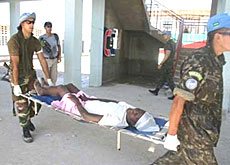
Aid for stricken Haiti steps up a gear

As Haiti starts to bury hundreds killed in floods from hurricane Jeanne, Swiss aid organisations are appealing to the public to come forward with donations.
The government and charities have already made over SFr600,000 ($477,000) available, but getting assistance to stricken areas is proving difficult.
The Swiss Agency for Development and Cooperation (SDC) on Tuesday added SFr225,000 to its contribution to the World Food Programme (WFP) for Haiti, providing a total of SFr1.16 million.
Private Swiss charities, including Caritas and Heks, say they have another SFr450,000 to offer. Also assisting the WFP are two experts from the Swiss Humanitarian Aid Unit who have been flown to Haiti.
But four days after two hurricanes struck the country, large areas are still impassable because of flooding and landslides. Supplies and medicine are waiting to be distributed, but aid groups are struggling to reach the increasingly desperate survivors.
Officials have confirmed the death toll at over 1,000 and the United Nations says it could reach 2,200. Over 1,200 people are reported missing, and presumed to have been washed out to sea, buried in mud, or trapped in houses still inaccessible to rescuers.
Supplies
The Swiss Red Cross last Friday sent 13 tons of supplies to the capital Port-au-Prince, but spokesman Karl Schuler says the deliveries are being held up because the main roads leading to stricken areas are still under water.
A special fund for Haiti has been set up in Switzerland, and so far the response has been good, says organiser Senta Graf. Donations can be made over the internet (see “related links”) and at post offices in Switzerland (account: 10-15000-6, marked “Haiti”).
In the past week, two hurricanes, Ivan and Jeanne, have swept across Haiti’s northwest province leaving 250,000 homeless. Worst hit were the port cities of Gonaives on the north coast and Port-de-Paix in the northwest.
On Wednesday, trucks started conveying bodies to mass graves, and hundreds more were piled up outside morgues without electricity.
Epidemics
Aid workers say the clean up needs to start without delay to avoid epidemics of waterborne diseases, malaria and tetanus.
“It’s a critical situation in terms of epidemics, because of the bodies still in the streets. People are drinking dirty water and scores are getting injuries from debris and becoming infected,” say Françoise Gruloos, Haiti director for the United Nations Children’s Fund.
Gruloos added that people were still marooned on the roofs of their homes, surrounded by floodwaters and mud, and to frightened to come down.
Television images shot from helicopters showed the bodies of people and animals alongside piles of debris, as survivors holding limes to their noses trudged through the mud seeking safety.
Floods
Various Swiss aid agencies, NGOs and the International Committee of the Red Cross (ICRC) have been in the country since May when it was last hit by floods.
Those caused widespread devastation along the border with the Dominican Republic. Some 1,191 people were killed in Haiti, and a further 395 died in the Dominican Republic.
Haiti is the poorest country in the western hemisphere with an annual average income of $150 per person. A political crisis forced the president Jean Bertrand Aristide to flee the country in February, and it has been under military rule since then.
Poverty has forced the population to cut down trees for fuel causing widespread deforestation, and leaving the country particularly vulnerable to floods and landslides. Experts estimate that just 1.4 per cent of the original forest cover remains.
swissinfo with agencies
Over 1,000 people have been killed, and the death toll is expected to reach 2,200.
Haiti has been struck by two devastating hurricanes in the past week.
Widespread deforestation has left the country vulnerable to floods and landslides.
Donations to assist the aid operation in Haiti can be made over the internet (see link below) or at post offices in Switzerland (account: 10-15000-6, marked “Haiti”).
The country is the poorest in the western hemisphere, and this year has been wracked by political unrest and natural disasters.
Aid groups arrived in May following floods which killed 1,191 people.

In compliance with the JTI standards
More: SWI swissinfo.ch certified by the Journalism Trust Initiative
















![The four-metre-long painting "Sonntag der Bergbauern" [Sunday of the Mountain Farmers, 1923-24/26] had to be removed by a crane from the German Chancellery in Berlin for the exhibition in Bern.](https://www.swissinfo.ch/content/wp-content/uploads/sites/13/2025/12/01_Pressebild_KirchnerxKirchner.jpg?ver=cb688ed5)














You can find an overview of ongoing debates with our journalists here . Please join us!
If you want to start a conversation about a topic raised in this article or want to report factual errors, email us at english@swissinfo.ch.